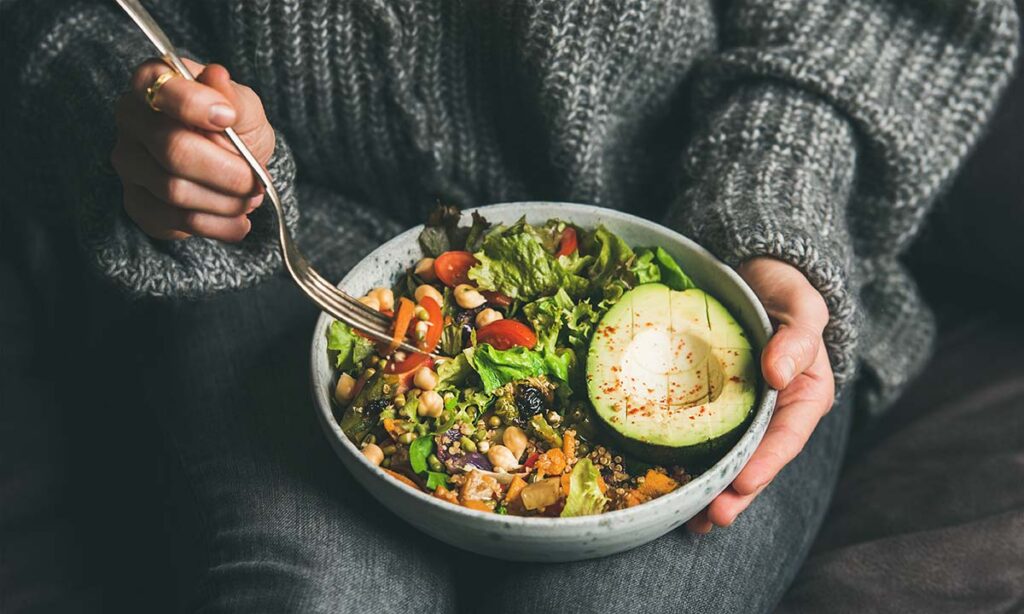Most people know that adhering to a nutritious, well-balanced diet can be vital to living a long and happy life. In addiction treatment, consuming nutrient-dense foods can nourish and revitalize the body and mind following drug or alcohol use. Knowing more about foods for addiction recovery can improve treatment outcomes and help individuals sustain sobriety.
Participating in a nutrition therapy program and receiving addiction treatment from a top-notch center like Recovery Ranch in Tennessee can be crucial for recovery. Call 1.844.876.7680 today to learn how we can help you achieve long-term sobriety and wellness.
Nutrition for Addiction Recovery
Healthy foods for addiction can replenish the body’s vital nutrients, minerals, and vitamins. A balanced diet of essential proteins, carbohydrates, fats, and micronutrients can keep the body functioning while providing much-needed energy throughout the day. A nutritious diet also boosts mood and cognitive functioning, enabling individuals to manage cravings and other challenging emotions associated with addiction recovery.
Additionally, consuming a nutrient-dense diet can reduce inflammation and oxidative stress in the body, helping to improve overall immunity compromised due to drug use. Proper nutrition can also speed up detoxification processes and minimize withdrawal symptoms such as nausea and loss of appetite.
What to Eat In Recovery
Nutrition therapy programs enable people to cook and eat healthily, learn why a healthy diet is essential during and after recovery, and understand how good nutrition can help them sustain their progress in recovery. Considering how central food is to mental, emotional, and physical health, leveraging the benefits of the foods for addiction recovery listed below can be an effective way to help your body heal.
Poultry and Fish
Substance use disorders can prevent the body from adequately processing tyrosine—an amino acid that produces neurotransmitters such as dopamine, which can significantly affect mood and cognition. For this reason, adding more fish and poultry to your diet may enhance your mood, mental clarity, and well-being.
Bananas and Other Sources Of Potassium
Bananas are another food that can help the body heal following drug or alcohol addiction. Not only can bananas be a convenient snack, but they are also a source of tryptophan—an amino acid vital to serotonin production for healthy sleep.
While bananas are well-known for being rich in potassium, they are also good sources of vitamins B6 and C. The high amounts of potassium a banana contains can be conducive to recovery, considering how common it is for individuals with substance use disorders to have low potassium and magnesium levels. These minerals are electrolytes that regulate blood pressure, heartbeat, nerves, and muscles.
Berries and Vegetables
Blueberries can be helpful because they contain antioxidants. Antioxidants are crucial in boosting immune system function and enhancing immune health. Furthermore, they can prevent, reduce, and slow cellular damage caused by toxins and free radicals created by alcohol and drug addiction.
When dealing with addiction, individuals may experience malnutrition caused by improper nutrition absorption and a poor diet. Fortunately, vegetables provide various minerals, vitamins, fiber, and other nutrients the body needs for optimal fuel and function. A diet consisting of rich vegetables can effectively restore the body to proper nutrition. Leafy greens like kale, starch-rich vegetables like potatoes, and cruciferous vegetables like broccoli can restore the body to good health following addiction.
Whole Grains
Whole grains are excellent to eat during addiction treatment and recovery, as they can provide complex carbohydrates to the body that enable you to feel fuller for longer. Furthermore, whole grains are an excellent source of fiber that can help the digestive system recover from damage caused by drug and alcohol use. Whole-grain pasta and other fiber-rich foods can act like probiotics: providing energy, jump-starting your digestive system, and enhancing your digestive health.
Consider replacing bread and pasta made with white flour or high-fructose corn syrup with substitutes made of whole grain. Whole-grain bread demonstrates effectiveness in lowering the risk of diabetes. Another switch you could make is trading in white rice for quinoa.
The Ranch Can Guide You to Recovery
Recovery Ranch offers high-quality treatment for both those who struggle with addiction to alcohol or drugs, as well as care for those with mental health concerns. We provide multiple forms of recovery because substance use disorders vary from person to person. We can answer your questions and build a care program that meets your needs.
The experts at The Ranch understand that the types of substances a person uses can impact how they detox and heal. We consider this when evaluating clients during the admissions process. Fill out our contact form or call 1.844.876.7680 to speak with a clinician and create an individualized treatment program that helps you achieve lasting sobriety.


